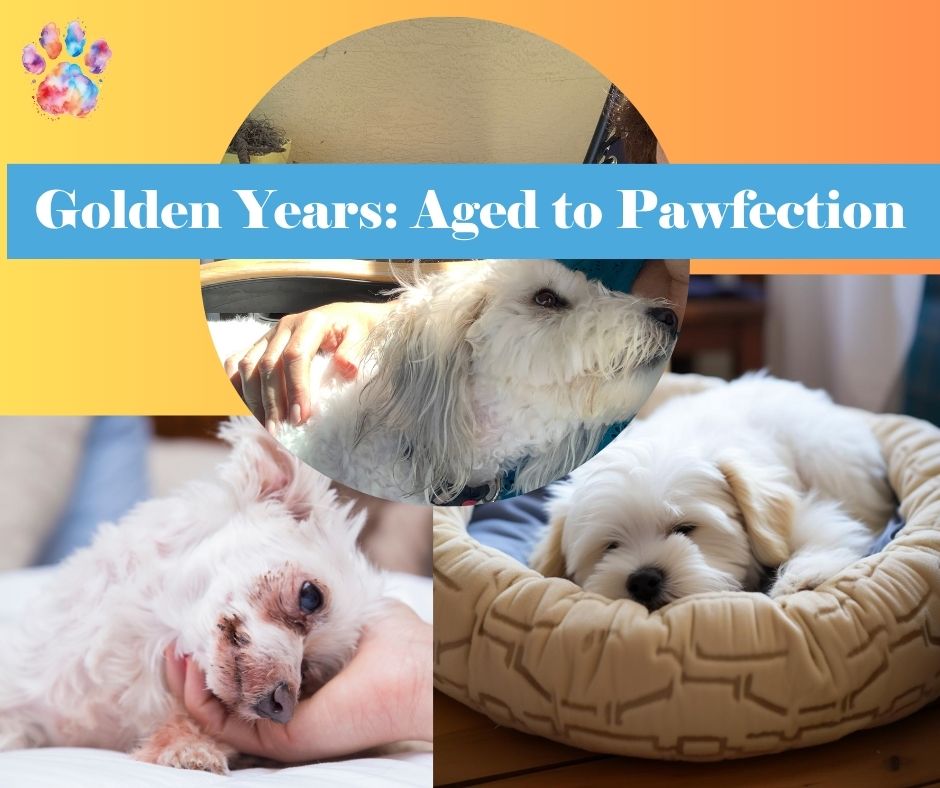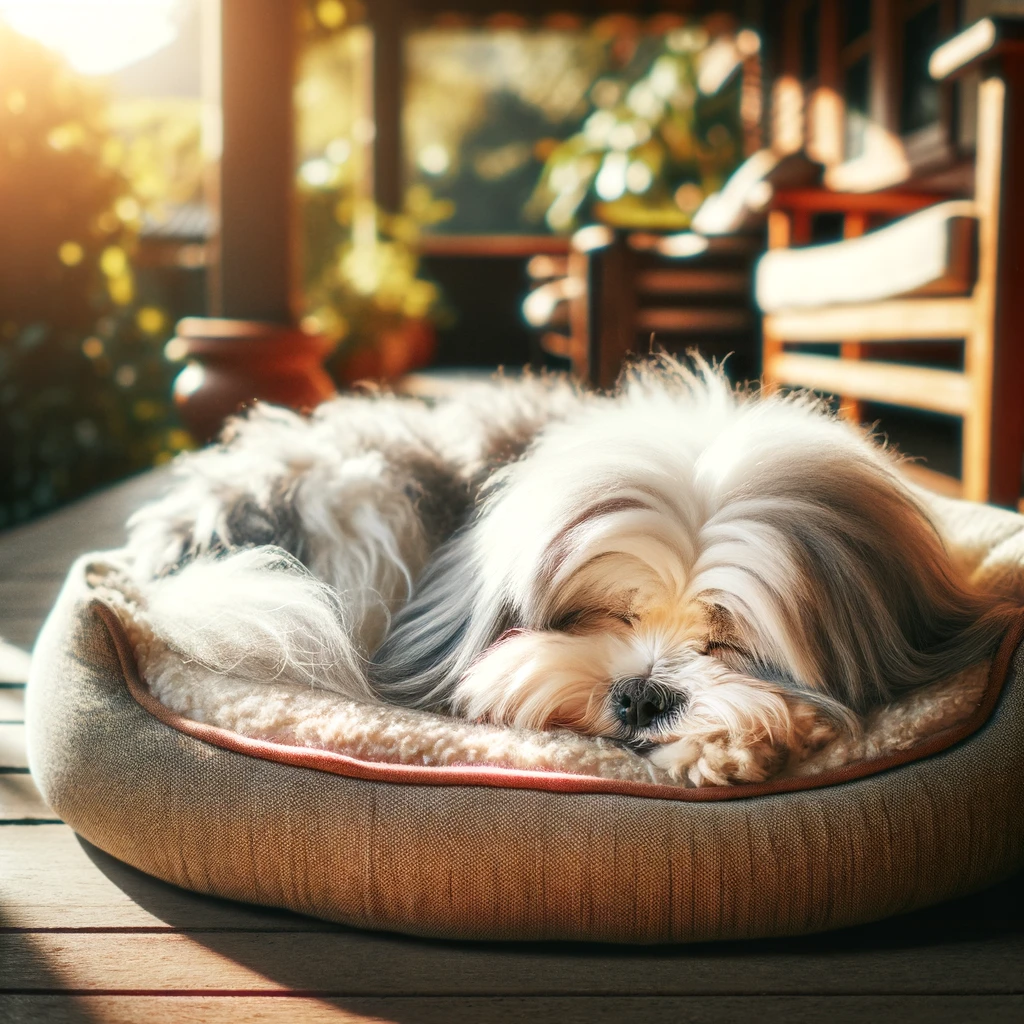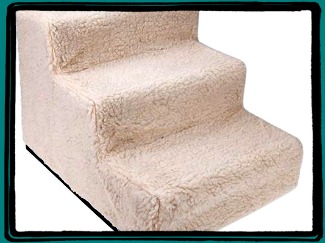Senior Dog Care Tips to Help Your Dog Thrive and Live Longer
Senior dog care is so important to ensure your dog’s later years are filled with as much love, companionship, and attention as when he was a puppy. Your senior dog may be a little slower but can still have a high-quality life as he ages.

One of the hardest parts of being a pet parent is watching your dog decline in their advancing years. Before my dog, Luc, passed, his vision and hearing were impaired, and his mobility was limited due to arthritis.
But what amazed me was Luc's resilience. I didn't even know he had a vision problem until I took him to a friend's house, and he was walking into furniture.
At home, he could manage just fine because he was familiar with his environment. During our daily walks, he walked super slow because of his arthritis, but his tail was still wagging, and he looked forward to every single walk.
I've learned so much about life and resilience from my dogs!
According to the ASPCA your dog is a senior when:
- Small breeds (less than 20 pounds) - 7 years of age
- Medium breeds (21 to 50 pounds) -7 years of age
- Large breeds ( 51 to 90 pounds) -6 years of age
- Giant breeds ( 91 pounds or more) -5 years of age
The Coton de Tulear is known to live a relatively long time for a dog (14-17 years). When your dog reaches this age, he will need a different kind of attention from you and may have special health or training needs.
When your dog reaches his senior years, it's important to pay attention to any changes in physical and emotional behavior.
Obviously, if your dog has severe health conditions, working with your veterinarian to devise the best plan is essential.
Changes can creep up slowly and are often hard to notice from day to day. Specific things to look out for are changes in appetite and weight, excessive thirst, lethargy, signs of pain, limping, anxiety, lack of mental sharpness, and changes in behavior.

10 Tips to ensure the best quality of life for your senior Coton de Tulear (or any dog)
No. 1 - Routine veterinary care. It’s essential for a thorough exam at this age to prevent any unnecessary health issues down the road. Basic diagnostic tests (blood, urine, hearing, and vision) can help evaluate whether medical intervention is necessary.
No. 2 - Hydration. Make sure your dog gets just enough water. Give enough to hydrate and keep his body functioning properly, but notice if he is drinking too much because this can be a sign of kidney problems or diabetes.
No. 3 - Weather management. If you live in extremely hot or cold climates, ensure your pet is as comfortable as possible.
In the heat, don't let your dog stay outside or over-exercise. Ensure he has access to plenty of water while out in the heat. Learn what summer heat tips our visitors recommend here.
In the cold, your older dog can be much more sensitive to the cooler air than he was when he was younger. Don't let him stay out too long, and you may want to keep him warm with a sweater or snow boots. Check out some tips from our visitors for coping with winter weather.
No. 4 - Keep calm. It’s important to reduce stressful situations and abrupt changes in daily routines with an older pet. Older dogs find it challenging when their schedules are out of whack. New routines, new homes, new people or other animals, or even new food can be stressful to your dog.
And even more importantly, Cotons are so attuned with us that they pick up on our emotions. They will likely become worried and stressed if you're worried and stressed. You can find ideas for calming aids here.
No. 5 - Avoid too much alone time. If you have to leave your dog alone for long periods of time, have someone he knows and trusts come and take care of him.
Older dogs need more attention than young ones, so leaving them alone for too long is not advisable. If you must board your dog, take him for short trips to the kennel BEFORE leaving so he's not alone in a strange place with strange people. You don't want him to be put in that kind of stressful situation.
No. 6 - Examine your dog's bedding. Can he get in and out of bed easily if he sleeps with you? Pet stairs or a pet ramp can help.
If your dog sleeps in his own bed, is the cushion soft enough? Warm enough? Is there enough room for your dog to stretch out?
For years, Luc preferred to sleep on the tile floor, no matter how many beds I had for him. But when he got older, he slept in my bed or on his padded egg crate dog bed.
There are all kinds of dog beds to help your senior sleep more comfortably. If your dog has arthritis or joint pain, memory foam or orthopedic beds can help.
As your dog ages, regulation of body temperature can become impaired. As a result, they become less tolerant of heat and cold. There are cooling beds and warming beds that can provide relief. Senior dog care is often about making your dog as comfortable as possible.
No. 7 - It may be time to change your dog's diet. Most dogs' metabolic rate slows as they age, and they can put on weight if their diet doesn't change. Cutting down on treats and table scraps can help. Or switch to snacks like carrots, green beans, celery sticks, apple or cucumber slices.
There are commercial foods that are developed specifically for the nutritional needs of older dogs. And, of course, if your dog has health issues such as diabetes or heart disease, it's important to work with your vet to determine the best diet. Whatever food you choose, make sure it's high quality, and as always, any dietary changes should be incorporated slowly.
No. 8 - Dental care is even more important as your dog gets older. Watch for signs of broken or loose teeth, sudden bad breath, drooling, and difficulty chewing. Teeth cleaning can reduce the chances of heart, lung, and kidney disease. Dental care is such a simple thing that can prolong your dog's life.
No. 9 - Do you have a good relationship with your veterinarian? This is especially important as your dog ages and may need more medical attention. Trust is an essential factor in finding a good vet, and it's also a plus if you find someone familiar with this rare breed. If you don’t feel like your dog is getting quality care, find another vet!
No. 10 - Does your dog limp or have difficulty going up and down stairs? Your vet can determine if your dog has arthritis by taking X-rays. The sooner you get a diagnosis, the more chance of slowing down the progression of symptoms.
There are all kinds of senior dog care that can help your dog feel better. Some dogs do well with massage, hydrotherapy, medication, weight loss, acupuncture, whirlpools, supplements, and herbs. My dog, Lucy, has had remarkable success using many of these modalities after she had a back injury.

Senior Dog Care Checklist
- Health Check-ups
- Regular Veterinary Visits: Schedule at least annual check-ups.
- Vaccinations: Ensure all vaccinations are up to date.
- Dental Check: Regular dental checks to prevent dental disease.
- Eye and Ear Exam: Check for signs of cataracts, hearing loss.
- Weight Monitoring: Keep track of your dog’s weight.
- Behavioral Changes: Notice sudden changes in behavior.
- Nutrition
- Senior Dog Food: Provide a balanced diet suitable for older dogs.
- Supplement Support: Consider supplements for joint problems.
- Hydration: Always keep water bowls available with fresh water.
- Exercise and Mobility
- Regular Exercise: Tailor exercise routines to your dog’s ability.
- Mobility Aids: Use ramps or steps to help your dog access higher places.
- Joint Support: Provide orthopedic beds or mats to help with joint issues.
- Grooming
- Regular Grooming: Keep fur trimmed and nails short.
- Skin Check: Regularly check for bumps, lumps, or signs of skin infections.
- Mental Health
- Mental Stimulation: Provide puzzle toys, new training, or socialization.
- Provide Calming Aids if necessary. Many dogs become more anxious.
- Routine: Maintain a consistent routine to help reduce anxiety.
- Home Safety
- Remove Hazards: Ensure the living area is safe and free from hazards.
- Comfortable Space: Create a comfortable, easily accessible space.
- Medication Management
- Medication Schedule: Keep a schedule for any prescribed medications.
- Side Effect Monitoring: Monitor for any side effects.
- End-of-life Care
- Comfort Care: At this stage of life, comfort is one of the most important things.
- Quality of Life Assessment: Regular assessments to ensure your dog's quality of life.
Click here to print this checklist.
You want your Coton to be as happy and healthy for as long as possible. Learn more about senior dog care by clicking on these important links about caring for your older dog:
Related Links for Senior Dog Care:
What should you feed an older dog?
How to keep your older pets healthy
How to treat or prevent canine obesity
Is pet health insurance right for you?
Good dental care can prolong your dog's life
Is homeopathy right for your dog?
Home | About Me | Contact Me | Privacy Policy |Disclosure
Copyright© 2008- All Rights Reserved







